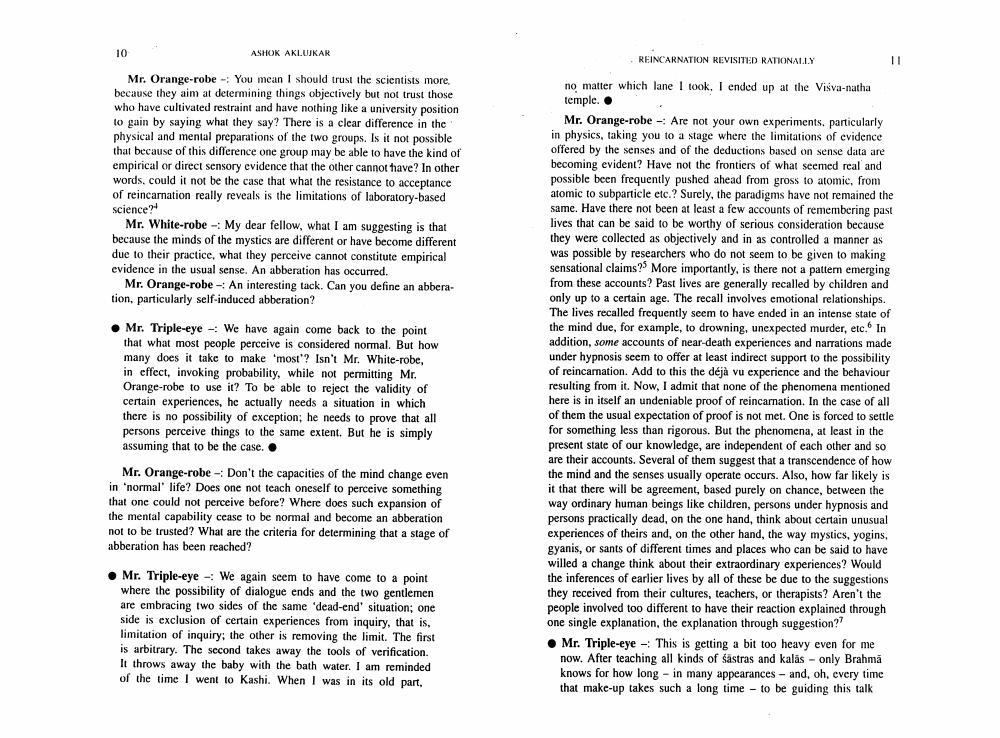Book Title: Reincarnation Revisited Rationally Author(s): Ashok Aklujkar Publisher: Ashok Aklujkar View full book textPage 5
________________ 10 ASHOK AKLUJKAR Mr. Orange-robe: You mean I should trust the scientists more. because they aim at determining things objectively but not trust those who have cultivated restraint and have nothing like a university position to gain by saying what they say? There is a clear difference in the physical and mental preparations of the two groups. Is it not possible that because of this difference one group may be able to have the kind of empirical or direct sensory evidence that the other cannot have? In other words, could it not be the case that what the resistance to acceptance of reincarnation really reveals is the limitations of laboratory-based science?+ Mr. White-robe: My dear fellow, what I am suggesting is that because the minds of the mystics are different or have become different due to their practice, what they perceive cannot constitute empirical evidence in the usual sense. An abberation has occurred. Mr. Orange-robe -: An interesting tack. Can you define an abberation, particularly self-induced abberation? Mr. Triple-eye: We have again come back to the point that what most people perceive is considered normal. But how many does it take to make 'most? Isn't Mr. White-robe, in effect, invoking probability, while not permitting Mr. Orange-robe to use it? To be able to reject the validity of certain experiences, he actually needs a situation in which there is no possibility of exception; he needs to prove that all persons perceive things to the same extent. But he is simply assuming that to be the case. Mr. Orange-robe: Don't the capacities of the mind change even in 'normal' life? Does one not teach oneself to perceive something that one could not perceive before? Where does such expansion of the mental capability cease to be normal and become an abberation not to be trusted? What are the criteria for determining that a stage of abberation has been reached? Mr. Triple-eye: We again seem to have come to a point where the possibility of dialogue ends and the two gentlemen are embracing two sides of the same 'dead-end' situation; one side is exclusion of certain experiences from inquiry, that is, limitation of inquiry; the other is removing the limit. The first is arbitrary. The second takes away the tools of verification. It throws away the baby with the bath water. I am reminded of the time I went to Kashi. When I was in its old part, REINCARNATION REVISITED RATIONALLY no matter which lane I took, I ended up at the Visva-natha temple. 11 Mr. Orange-robe: Are not your own experiments, particularly in physics, taking you to a stage where the limitations of evidence offered by the senses and of the deductions based on sense data are becoming evident? Have not the frontiers of what seemed real and possible been frequently pushed ahead from gross to atomic, from atomic to subparticle etc.? Surely, the paradigms have not remained the same. Have there not been at least a few accounts of remembering past lives that can be said to be worthy of serious consideration because they were collected as objectively and in as controlled a manner as was possible by researchers who do not seem to be given to making sensational claims?5 More importantly, is there not a pattern emerging from these accounts? Past lives are generally recalled by children and only up to a certain age. The recall involves emotional relationships. The lives recalled frequently seem to have ended in an intense state of the mind due, for example, to drowning, unexpected murder, etc. In addition, some accounts of near-death experiences and narrations made under hypnosis seem to offer at least indirect support to the possibility of reincarnation. Add to this the déjà vu experience and the behaviour resulting from it. Now, I admit that none of the phenomena mentioned here is in itself an undeniable proof of reincarnation. In the case of all of them the usual expectation of proof is not met. One is forced to settle for something less than rigorous. But the phenomena, at least in the present state of our knowledge, are independent of each other and so are their accounts. Several of them suggest that a transcendence of how the mind and the senses usually operate occurs. Also, how far likely is it that there will be agreement, based purely on chance, between the way ordinary human beings like children, persons under hypnosis and persons practically dead, on the one hand, think about certain unusual experiences of theirs and, on the other hand, the way mystics, yogins, gyanis, or sants of different times and places who can be said to have willed a change think about their extraordinary experiences? Would the inferences of earlier lives by all of these be due to the suggestions they received from their cultures, teachers, or therapists? Aren't the people involved too different to have their reaction explained through one single explanation, the explanation through suggestion?? Mr. Triple-eye: This is getting a bit too heavy even for me now. After teaching all kinds of sastras and kalās - only Brahma knows for how long in many appearances - and, oh, every time that make-up takes such a long time to be guiding this talkPage Navigation
1 ... 3 4 5 6 7
